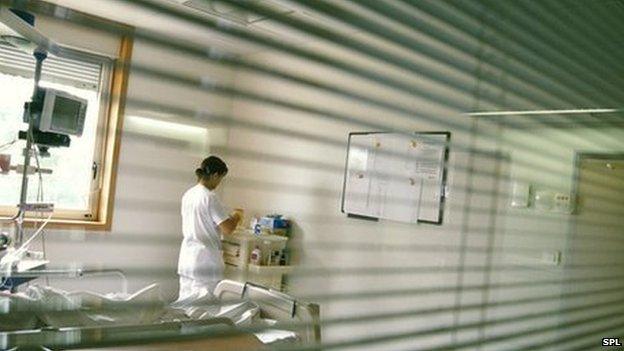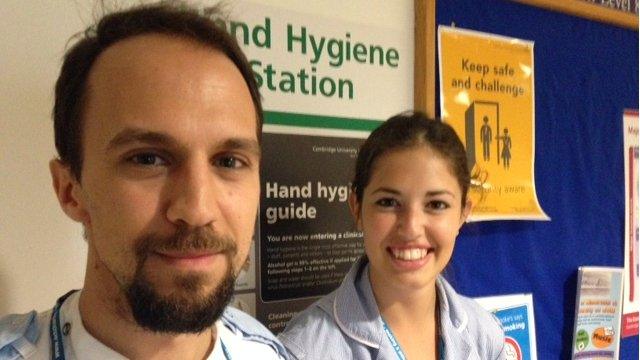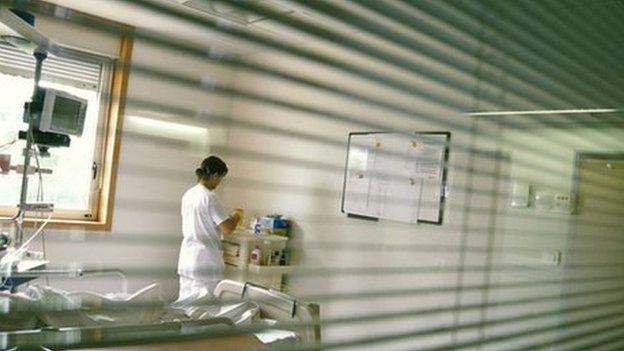NHS nurse recruitment from EU 'too aggressive'
- Published

Nursing leaders in Portugal, Spain and Italy say "aggressive strategies" are being used to "fool" a growing number of their staff into working in the NHS.
Increasing numbers of young graduates are tempted by UK salaries up to three times what they might earn at home.
A body representing UK recruitment companies has admitted a few agencies "misrepresent" the work they offer.
Health Education England says it is increasing the number of nurse training places in England to fill NHS gaps.
Nursing shortages
In an HEE film, external, used to attract EU nurses, new arrivals to the NHS in the West Midlands are asked why they left Spain and Portugal.
They refer to the career and skills opportunities in the UK - as well as higher salaries.
But Portugal has its own nursing shortages.
The vice-president of Portugal's nursing regulator, Dr Bruno Gomes, told BBC News: "Some recruitment firms have very aggressive tactics.
Temporary work
"The companies - mainly from the UK - come to the nursing schools, and hold big conferences in the fourth year of the degree.
"Among the conditions they offer is free language training, and sometimes accommodation for three or even six months."
Spanish Council of Nursing president Dr Maximo Jurado told BBC News: "They lie - they fool nurses.
"Perhaps a group of nurses go to a country, rent a flat, and they think they are going to work at a particular hospital.
"Then that company organising temporary work sends nurses one day to a hospital in one city, another day to a different hospital in a different city."
'Poor planning'
Spain sends the largest number of nurses to the UK - about 2,000 last year.
Dr Jurado added: "There is a more general problem of poor planning by the NHS.
"Any health service in any country has to do appropriate planning for the future - because otherwise nurses will have to be recruited from other countries.
"We are all trying to plan for the future, in order not to have such a big gap."
'Lower salary'
Sometimes, the NHS enters into formal overseas agreements with local staffing boards - 150 nurses from Venice came to three hospitals in Manchester in this way.
Dr Genarro Rocco, who helps lead Italy's nursing colleges, said: "We have had just a few complaints, but these are from nurses who were told they would be working in a hospital - and they end up providing just basic care instead.
"On other occasions, they were maybe getting a lower salary than what was promised."
Samantha Hurley, from the Association of Professional Staffing Companies (Apsco), said: ""We are aware that misrepresentation can happen when recruitment firms engage professional healthcare workers from other EU countries.
"The issue is one of a lack of understanding of the process.
'Ethical manner'
"In order to practise in the UK, healthcare professionals must register with the appropriate professional body and obtain a Pin number.
"Without which, for instance, a band-five nurse would not be able to work as such and would be in a position where they had to accept a band-two healthcare assistant role instead."
Apsco says foreign staff need comprehensive preparation and induction - as one study indicated up to a third returned home within a year.
Ms Hurley added: "We believe that the vast majority of recruitment firms which provide international staff are doing so in an ethical manner and are ensuring workers are properly inducted.
"But a minority of recruitment firms, based not only in the UK but also in other EU countries, are shipping over large quantities of workers without the appropriate support."
- Published28 July 2015

- Published22 June 2015
